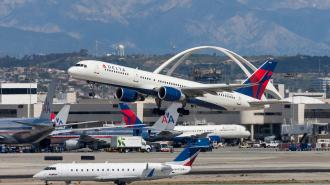Delta has unveiled a new prototype system that would allow passengers with a power wheelchair to use their own chair on a flight — aiming to eliminate the need for passengers to give up their own wheelchair.
“An innovation like this in air travel provides those with reduced mobility a safe and comfortable way for them to travel and remain in their own power wheelchair,” Chris Wood, the founder of Flying Disabled, said in a statement.
Flying Disabled is part of a consortium called Air4All — which includes aviation design firm PriestmanGoode and aerospace company SWS Certification — which worked with Delta Flight Products (DFP) to design the prototype.
Delta has unveiled a new prototype system that would allow passengers with a power wheelchair to use their own chair on a flight.
Debuted at the Aircraft Interiors Expo (AIX) in Hamburg, the system allows a passenger’s power wheelchair to essentially become the airplane seat, complete with headrest as well as center console and cocktail tray access. The system slots into existing seat racks and is designed to blend into the plane body, without any modifications.
“We wanted to make it feel like the airline is buying a product where you don’t really know it’s a disabled-access seat,” Daniel MacInnes, director of PriestmanGoode, told FastCompany. “When you fold it up, it makes the passenger in the wheelchair feel like they’re in this seat like everybody else and not made to feel like they’re in a unique product.”
Air travel’s power wheelchair problem: A passenger with a power wheelchair faces a unique set of challenges when they fly. Getting on your flight with a power wheelchair can be a difficult and disempowering experience.
After giving up their chairs, passengers are required to use airport-provided wheelchairs to get to the gate, then switch to airline-provided wheelchairs to navigate to their seats — seats which often don’t provide the necessary posture support they have in their chairs, Wood told FastCo.
Not only is comfort lost in the process, but agency as well. Being forced to use non-powered chairs that he can’t control himself leads to a “scary” loss of independence, Chris Lee, an avid traveler and power wheelchair user, told CNN.
After passengers surrender them, the chairs are also often mishandled and returned broken. Unlike most damaged luggage, this is no small concern for the people who depend on them; on two separate occasions, Lee’s been unable to drive his chair out of the airport.
According to the Department of Transportation’s Air Travel Consumer Report, of the 54,398 wheelchairs enplaned by the top 10 airlines in January 2023, 871 of them were reported as mishandled — meaning you run an almost 1 in 60 chance of your chair being returned to you worse for the wear each time you fly.
Empowering passengers: DFP and Air4All’s solution centers around the power wheelchair itself.
The prototype on display in Hamburg used a mockup of modified Boeing 737 seats, per FastCo. When no one needs to use it, the seat looks and works like a standard seat. When a passenger with a power wheelchair comes aboard, the chairback can be removed, the seat and armrest folded up and out of the way, and the user’s chair slots into the newly available space and attaches to the floor. The entire thing only takes a few minutes.
A passenger with a power wheelchair faces a unique set of challenges when they fly. Getting on your flight with a power wheelchair can be a difficult and disempowering experience.
“This patented design offers new possibilities for customers with disabilities to enjoy a travel experience they truly deserve,” DFP president Rick Salanitri said in a statement.
The process to design it was collaborative, with people with power wheelchairs consulted along the way. “This has been done with some serious backing from the community to give their feedback,” Wood told CNN.
Drawbacks: While a potentially important improvement, the system does leave a major concern unaddressed: airplane lavatories are currently inaccessible for power chairs, meaning a transfer to an airline-provided wheelchair would still be necessary for going to the bathroom.
After the Hamburg showing, the work to bring the seat from showroom to fuselage will begin.
“We’re going through the testing and development and certification for the chair that is going to make that chair viable to go on an aircraft – we’re projecting within 18 months,” Tyler Anderson-Lennert, product innovation manager at DFP, told CNN.
For passengers like the globe-trotting Lee, the new seats are a long-awaited development.
“For decades, people with disabilities have been fighting for more accessible air travel, and this feels like a huge step (or a giant roll) toward real inclusivity,” Lee told CNN.
We’d love to hear from you! If you have a comment about this article or if you have a tip for a future Freethink story, please email us at [email protected].




